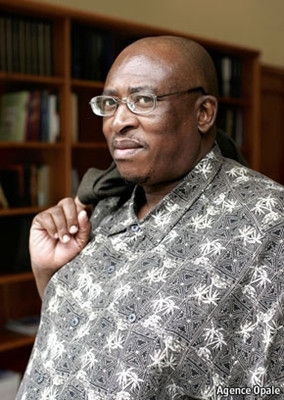Books and Arts; Book Review;Post-apartheid South Africa;The rejected son;
文藝;書評(píng);后種族隔離時(shí)代的南非;游子被拒在外;
Sometimes There is a Void: Memoirs of an Outsider. By Zakes Mda.
有時(shí)候有一種空虛:局外人回憶錄;Zakes Mda著。
They “stopped the gravy train just long enough to get on themselves,” said Desmond Tutu in disgust over the post-apartheid greed of South Africa's liberation elite. If Zakes Mda's account is anything to go by, the Nobel laureate was guilty of understatement. The African National Congress (ANC), he claims, is “overtaking Nigeria” in patronage and cronyism.
對(duì)南非解放精英在后種族隔離時(shí)代的貪婪,戴斯蒙德·圖圖(Desmond Tutu)氣憤地這樣說,“他們長(zhǎng)時(shí)間停下這輛財(cái)富之車好讓自己上去”。扎克斯·姆達(dá)(Zakes Mda)宣稱,非洲國民大會(huì)在贊助和任人唯親上已“超過尼日利亞”。如果他的看法有任何參考意義的話,那這位諾貝爾和平獎(jiǎng)得主(Desmond Tutu)恐怕低估了情況。

J.M. Coetzee, Christopher Hope, Damon Galgut and other South African writers have also been critical of the country's governing party. But Mr Mda's attack is far more bruising than theirs. Not only is he the country's leading black playwright and novelist; as a member of a prominent family forced to flee apartheid South Africa, and as an angry campaigner during those harsh years, his political credentials are impressive.
J.M. Coetzee, Christopher Hope, Damon Galgut 等其他一些南非的作家都對(duì)執(zhí)政黨持批評(píng)態(tài)度。但是姆達(dá)先生的攻擊比他們的更加激烈。在本國他是黑人劇作家和小說家的領(lǐng)軍人物,當(dāng)顯赫家族被迫逃離種族隔離政策的南非時(shí)他是一員,在那些艱難的歲月里他成為一個(gè)憤怒的活動(dòng)家,他的政治立場(chǎng)總是讓人印象深刻。
His father, A.P. Mda, was the “founding spirit” of the Pan Africanist Congress of Azania (PAC), which broke with the ANC in 1959 in protest against, among other things, that party's links with the Soviet Union. In political exile Mda senior practised law in Lesotho where, as an austere Christian, he embodied the PAC's motto: “Service, Sacrifice and Suffering”. He charged deserving clients little or nothing for his services and moved his impoverished family into what his son describes as a slummy township. Their house had no electricity, a rusty corrugated iron roof and no ceiling; “the toilet was a pit latrine outside and we had to draw water from a communal tap a few streets away.”
他的父親,A.P. Mda是阿爾扎尼亞泛非主義者大會(huì)(PAC)的精神鑄造者,PAC于1959年與ANC進(jìn)行對(duì)抗時(shí)破裂,此外,PAC還是一個(gè)與蘇聯(lián)有關(guān)的政黨。在政治流放時(shí)姆達(dá)前輩曾在萊索托從事過法律方面的事,也就是在這兒,作為一個(gè)嚴(yán)謹(jǐn)?shù)奶熘鹘倘耍`行著PAC的宣言“奉獻(xiàn),犧牲和忍耐”。對(duì)于那些值得幫助的人他往往是服務(wù)了卻不收錢或只收一點(diǎn)點(diǎn)錢,而他自己家卻搬到了兒子口中所謂的貧民窟中。他們家里沒有電,有的只是沒有天花板的波紋鐵皮屋頂;“至于衛(wèi)生間也只是外面有一個(gè)蹲坑而且我們還得從幾公里以外的公用自來水處抽水。”
The underlying and sometimes overriding theme in Mda junior's anguished autobiography is his admiration for his father's life and his failure to live up to it. He is, he bravely admits, a physical coward. His only stab at violent political action ended in farce. He was commissioned to murder an alleged Communist spy but was so frightened that he emerged from behind a boulder to hand over his Derringer pocket pistol to the man he was supposed to assassinate.
在姆達(dá)早期十分痛苦的自傳中,這潛在的有時(shí)是最重要的主題是他對(duì)父親生活的崇拜以及自己卻未能實(shí)現(xiàn)。他自己也坦然承認(rèn)是個(gè)典型的懦夫。他在暴力政治活動(dòng)中的僅有努力也以胡鬧而完事。他奉命去謀殺一名嫌疑的共產(chǎn)主義間諜,由于非常害怕,他逃到一塊巖石后面手持德林格(口袋里的小手槍)對(duì)準(zhǔn)那個(gè)他要暗殺的人。
The turmoil in Mr Mda's private life saddened his mother as well as his father. He constantly mistook lust for undying love and engaged in brief affairs with numerous women. The second of his three marriages ended in a protracted fight for the custody of children and the final pages of his book are spoiled by a spiteful assault on this former wife.
姆達(dá)混亂的私生活讓他的父母感到很傷心。他常錯(cuò)把情欲看成不渝的愛,和好多女的搞曖昧卻又匆匆了事。他的第三次婚姻以漫長(zhǎng)的爭(zhēng)奪孩子撫養(yǎng)權(quán)的斗爭(zhēng)而告終;他書的最后一頁在一次對(duì)前妻惡意施暴時(shí)弄臟了。
In contrast, Mr Mda achieved ever greater success in his public life. His plays were performed everywhere and he became a star turn at literary festivals in Europe and the United States. “We Shall Sing for the Fatherland”, a play he wrote 30 years ago, was once rated among his least political. It is now seen among his most prophetic as, in its author's words, it “l(fā)ooks at the life of the veterans of the liberation struggle who are now marginalised in the new society they helped to bring about.”
與此相反,姆達(dá)在他的政治生活上取得了巨大的成功。他的話劇到各地演出而他也成為明星出現(xiàn)在歐洲和美國文化節(jié)上。“我們?yōu)樽鎳璩保@個(gè)他在30年前寫的劇,在他最初的政治公演中還受到責(zé)罵。而現(xiàn)在它更多出現(xiàn)在他最多的預(yù)言中,用作者的話來說,“它看到解放斗爭(zhēng)中老兵的生活,老兵們促成了這個(gè)新社會(huì)卻生活在社會(huì)的邊緣。”
This was the fate of A.P. Mda, whose contribution to the struggle, his widow lamented, was entirely forgotten by the triumphant ANC. Like his father, Mr Mda also feels marginalised. He applied for several important cultural and media posts, the interviews went well but each time he was blackballed by the president's office. He helped set up a film and television production company and then found no new contracts were forthcoming from the South African Broadcasting Corporation after he refused “to pay the bribes that the commissioning staff of the national broadcaster demanded from producers”.
這就是A.P. Mda的命運(yùn),他的遺孀悲痛地說,他為斗爭(zhēng)所做出的貢獻(xiàn),在ANC大獲全勝之時(shí)已被統(tǒng)統(tǒng)忘到腦后。就像父親一樣,姆達(dá)也有邊緣化的感覺。他申請(qǐng)了幾個(gè)重要的文化和媒體發(fā)布,訪問進(jìn)行的很順利但是每次都會(huì)被總統(tǒng)辦公室給取消。他投資成立一個(gè)電視電影制作公司,他發(fā)現(xiàn)自從他拒絕行賄后也就是所謂的國家廣播公司協(xié)調(diào)人員向制片人的要求被拒后,南非廣播公司就再?zèng)]有新的合同了給他了。
As he was not wanted in his own country, Mr Mda left it to take up a professorship at Ohio University and strove to persuade himself that, as a liberal secular humanist, “South Africanness” was just one of his several identities. An autobiography suffused with love for his homeland says otherwise. So do his novels.
他感覺在祖國沒有歸屬感,姆達(dá)離開了南非去俄亥俄大學(xué)去深造,他極力說服自己,作為一個(gè)自由的世俗的人道主義者,“南非公民”只是他數(shù)個(gè)身份的一個(gè)。那飽含對(duì)祖國熱愛之情的自傳對(duì)他輕語“要不然呢”。他的小說也是如此。












